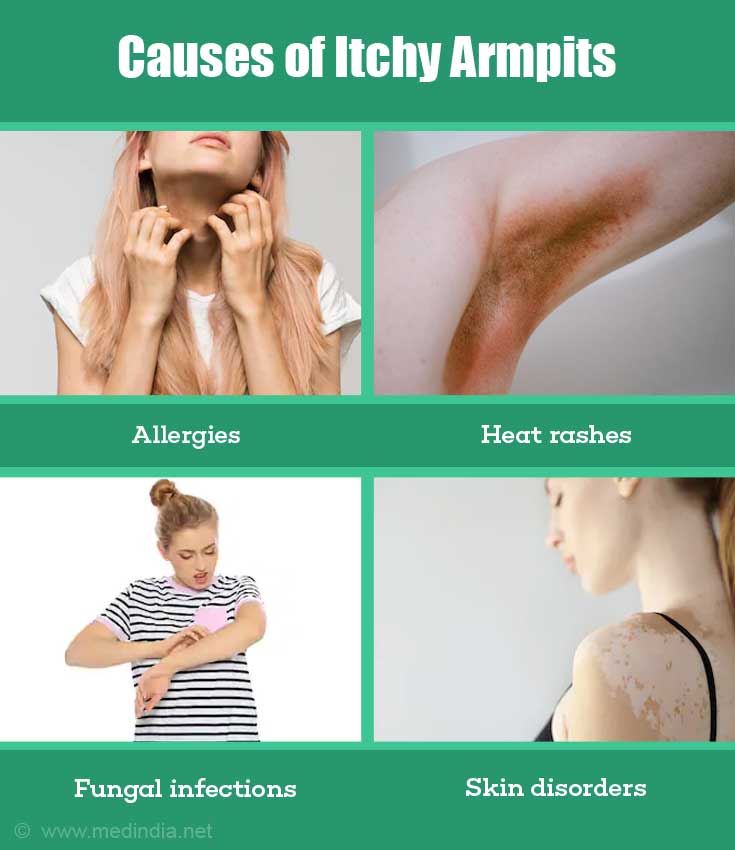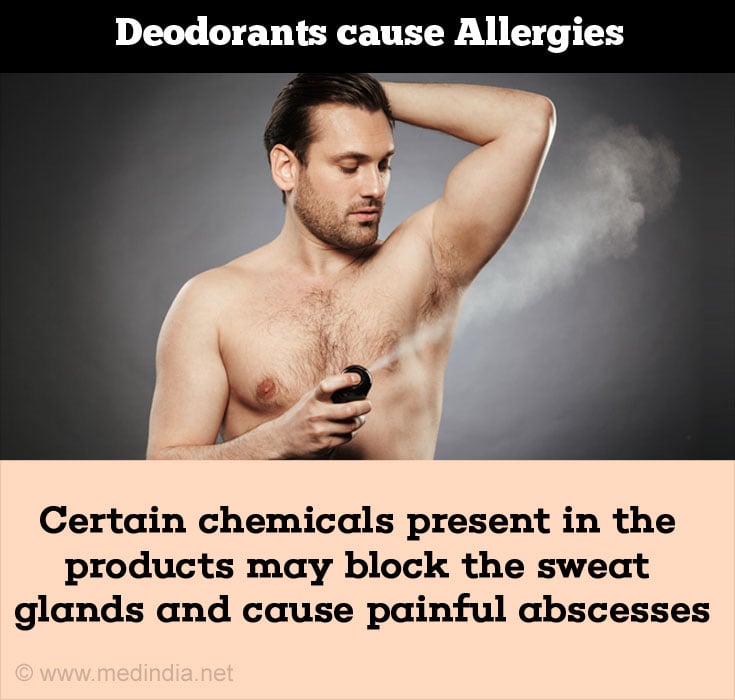- Itchy Armpits - (https://www.newhealthguide.org/itchy-armpits.html)
- How to Treat an Armpit Rash - (https://www.healthline.com/health/how-to-get-rid-of-an-armpit-rash)
- Home Remedies for Armpit Rashes - (https://www.medicalnewstoday.com/articles/321907.php#home-remedies)
- Here's Why You Should Not Use Antibacterial Soaps - (https://www.practo.com/healthfeed/here-s-why-you-should-not-use-antibacterial-soaps-26557/post)
- Amoxicillin and Clavulanic Acid - (https://medlineplus.gov/druginfo/meds/a685024.html)
What is Itchy Armpits?
Itchy skin, also known as “pruritus”, is an irritating, discomforting condition. It affect men and women and often cause a great deal of embarrassment. Itchy skin is usually attributed to improper hygiene. Itchy armpits are usually the result of pathogens like bacteria or microbes which infect the skin pores and release chemicals acting as irritants.
The degree of itchiness and irritation often depends on the cause of the itch. Infections usually cause severe itchiness along with a burning sensation. Apart from a sensation of itchiness, the condition may be accompanied by redness, soreness and slight swelling. Though scratching alleviates the irritation to some extent, excessive scratching can cause bleeding and scarring. Scratching can also lead to further infection and pus formation. It is best to seek medical help to avoid further infection.
What Causes Itchy Armpits?
Itchy armpits have multiple causes including allergies, heat rashes, fungal infections and other dermatological disorders.

An accurate diagnosis of the exact cause of itchy armpits is essential for proper treatment. Often, people with Type I and Type II diabetes may experience severe itchy armpits due to high blood glucose levels. For people with diabetes, it is essential to control blood glucose levels and maintain proper hygiene to avoid itchy armpits.
Other Causes of Itchy Armpits include:
- Personal hygiene – armpits are prone to fungal and bacterial infections due to dirt, sweat and body secretions. Regular washing is essential to maintain pH and normal skin microbiota (flora). People who do not wash the armpits at least once a day are prone to such infections. Using an antiseptic soap or wash can help reduce the levels of bacteria and other microbes.
- Candidiasis – is an infection caused by overgrowth of candida. Candida is a part of the normal skin flora necessary to maintain skin balance. However, candida may sometimes grow beyond normal levels and lead to infections. In people with HIV (human immunodeficiency virus), uncontrolled diabetes or other immune issues, candidiasis is common. This infection usually occurs in closed, moist areas of the body which are not exposed to sunlight, for example, armpits and groin. Other causes of candidiasis could be due to certain cancers, chemotherapy, hormone imbalances and corticosteroid therapy. Some people develop candida infections due to an allergic response to synthetic or tight clothing. Topical applicants like clotrimazole are usually recommended. If the infection is severe, oral antimycotic agents may be prescribed.
- Hyperhidrosis – is a condition which causes excessive sweating. Sweat provides a moist environment for bacterial and microbial growth thereby leading to infections. Hyperhidrosis is often observed in obese adults, people with hormone issues or issues of the basal metabolism. Certain drugs also cause this condition. Sportspersons and those involved in physical workouts are also prone to excessive sweating. In such cases, use of antiseptic soap and antiperspirant sprays may be helpful. In cases where hyperhidrosis is due to an underlying medical condition, it is essential to get medical help.
- Hidradenitis Suppurativa – sweat glands in the skin discharge secretions to the skin surface from time to time through ducts. If the ducts get blocked, cysts known as hidradenitis can occur. These cysts often get infected with bacteria like Staphylococcus aureus and form painful pus-filled cysts called Hidradenitis Suppurativa. Usually the pus dries and the cysts disappear. However, if the pus remains and causes other issues like pain, inflammation and fever, oral antibiotics like Amoxicillin Clavulanate are usually prescribed. Amoxicillin is a class of penicillin-like antibiotics and Clavulanic acid is a class of beta-lactamase inhibitors. Amoxicillin works by stopping the growth of bacteria and Clavulanic acid prevents bacteria from destroying the Amoxicillin.
- Miliaria Rubra – usually occurs in hot and humid environments. This is a type of heat rash due to blocked sweat glands. Miliaria Rubra usually appears like a red rash.
- Inverse Psoriasis – is an overgrowth of skin cells. Symptoms include red patches and thick, scaly skin. Obesity is observed as one of the causes. Low-dose steroids and drugs like Calcipotriene and Tacrolimus are helpful. In some patients, phototherapy can also be helpful.
- Dermatitis – is a common cause of itchy armpits. It causes redness and inflammation. Dermatitis is usually an allergic response to certain soaps, detergents, deodorants, perfume and some antibiotics. Avoiding the source of this allergy is usually helpful in alleviating the itchiness.
- Antiperspirants and deodorants – are often known to trigger allergic response from the skin. Certain chemicals present in these products may block the sweat glands and cause Miliaria Rubra, Hidradenitis Suppurativa and painful abscesses.(1✔ ✔Trusted Source
Itchy Armpits
Go to source)


Prevention and Treatment for Itchy Armpits
Personal hygiene is recommended for prevention of itchy armpits. Treatment of itchy armpits usually depends on the underlying cause.
The best way to prevent itchy armpits and consequent infections is improved hygiene. Washing the armpits at least once or twice a day with an antiseptic soap is helpful in preventing bacterial and microbial growth.(2How to Treat an Armpit Rash
Go to source) In hot and humid climes, people are advised to avoid tight, synthetic clothes and wear loose, cotton clothes that allow easy perspiration. In cases where perfumes, deodorants or other cosmetics are known to cause an allergic response, it is best to avoid these.
Depending on the Root Cause of the Itchiness, Treatment is Variable and includes:
- Antiseptic or antibacterial soaps – if lack of personal hygiene is found as the cause, doctors usually advise proper hygiene and prescribe mild antiseptic or antibacterial soaps.(3Here's Why You Should Not Use Antibacterial Soaps
Go to source) - Infections caused by candida usually require topical anti-fungal creams or ointments like clotrimazole. In some cases, an oral antibiotic may be required.

- Hyperhidrosis can be effectively treated with aluminum chloride hexahydrate 10-25% solution or gel. If this is not effective, 1% hydrocortisone cream is usually prescribed.(4✔ ✔Trusted Source
Amoxicillin and Clavulanic Acid
Go to source) - Heat rash, Miliaria Rubra and inverse psoriasis is usually treated with calamine lotion or hydrocortisone cream.
Home Remedies
Home remedies can be used to treat mild itchiness.(5Home Remedies for Armpit Rashes
Go to source) However, it is best to seek medical help if symptoms do not subside.
Some home remedies include:
- Bathing regularly with antiseptic solutions like Savlon or Dettol.
- Keeping armpits fresh by dipping cotton wool in rose water and cleaning.
- Using natural deodorants.
- Ice cubes can be used to alleviate burning sensation due to rashes.
- Vitamin-C rich foods can boost immunity and prevent frequent skin infections.

While these home remedies are used to soothe symptoms, it is necessary to visit a dermatologist or physician to get the right diagnosis and prevent frequent episodes.






